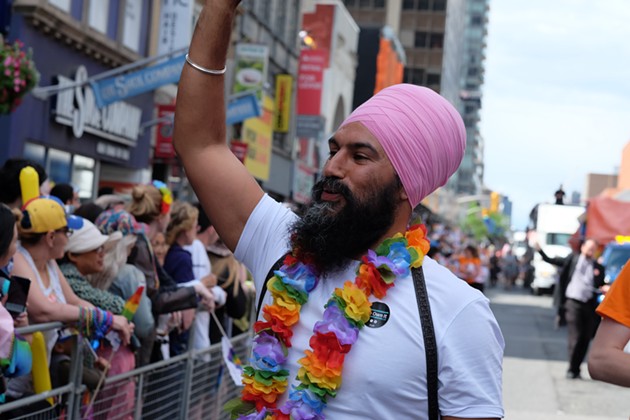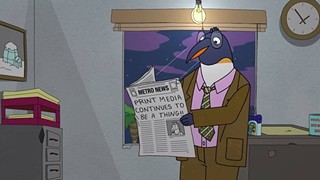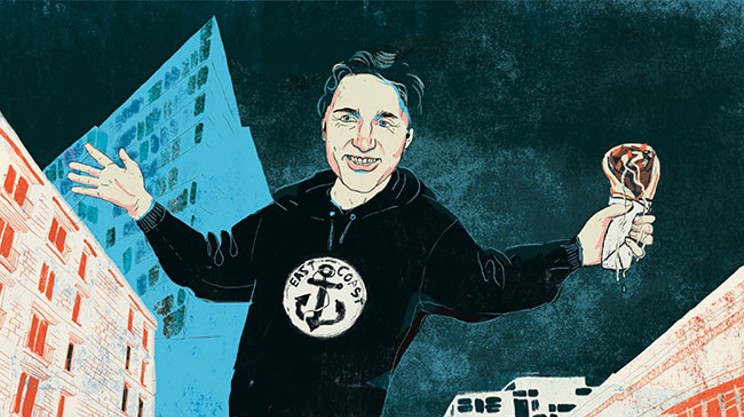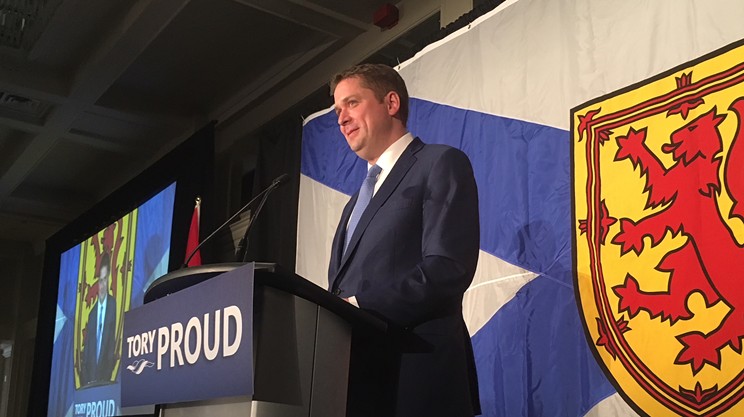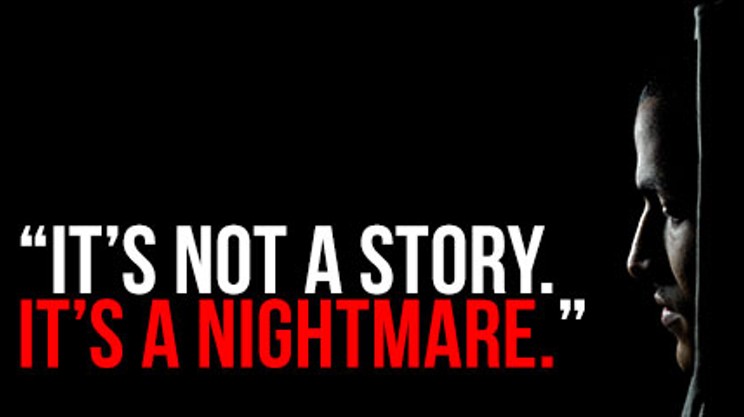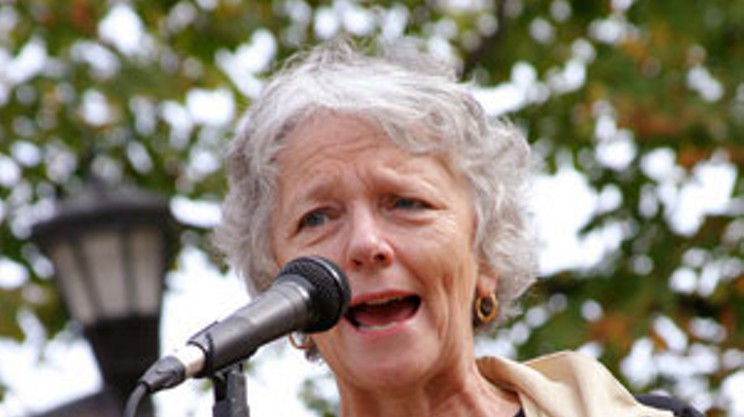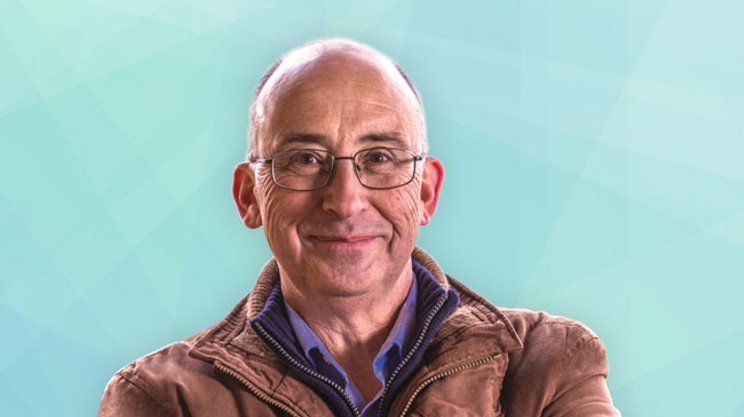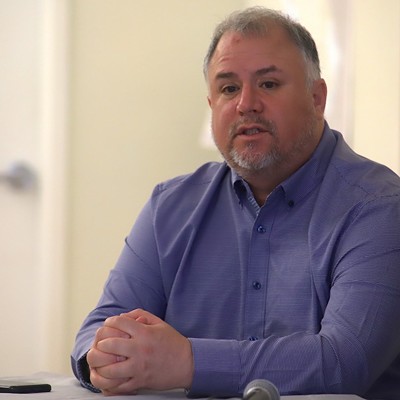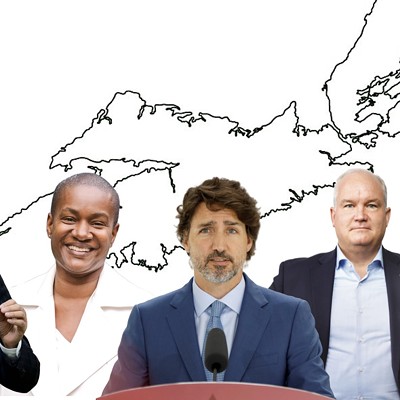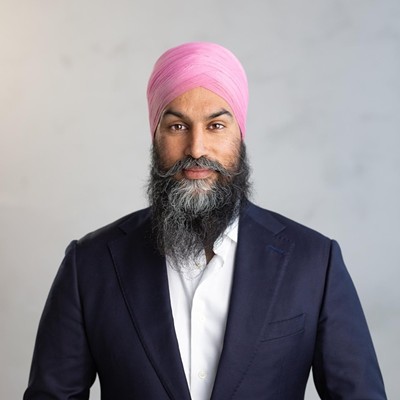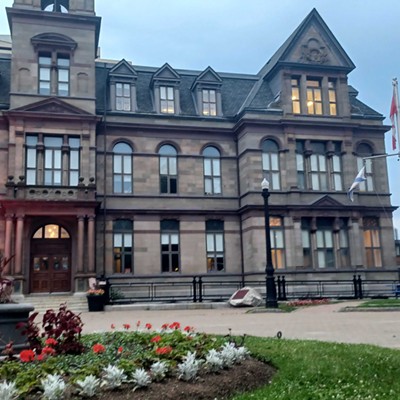Jagmeet Singh has been the federal leader of the New Democratic Party (NDP) since the beginning of October. He may be giving Justin Trudeau a run for his money—the “Jagmeet and Greet” event at Lion & Bright on Sunday was jam-packed with people, and tons more were lined up outside to shake Singh’s hand or snap a selfie. Both upon arrival and as he left his interview with The Coast, no shortage of people stopped him for hellos and photos. Obviously, being prime minister is about more than being the prince charming of Canada, so we sat down with Singh to discuss leadership, racism and style.
The Coast: The NDP has obviously gone through a lot of changes recently—change in leadership—and I know, provincially, it’s trying to reinvent itself as well. As a party, how do you continue to stay relevant while still staying true to your core values?
Jagmeet Singh: That’s the million dollar question. It’s not that hard, actually, because the values are values that actually matter to people. People want someone—a party or a person or a leader—that’s gonna stand up your them. That concept stands the test of time, it’s always true. And issues of justice are always relevant: making sure we have a more inclusive society, a more just society. Those things are always issues that matter. It’s just the way we communicate about them and the way we frame them. There’s ways to do it to keep the message engaging and exciting and inspirational, and I think that’s really the key—is to tap into the sentiment of fairness but in an inspirational, positive way.
Electoral reform, for example. It sounds like maybe a really dense, political topic: What does this mean, electoral reform? If you frame it like, hey, people should have their voice reflected in Ottawa, and in the Atlantic provinces 50 percent of people voted for a party other than the Liberals, but they got zero seats. One hundred percent of the seats went to one party. That seems to be a pretty unfair system. So we talk about, hey, how do we give people a chance to have their voice reflected more justly, more fairly in Parliament? And people are like, “Yeah, I’d like to have my voice reflected in Parliament. That makes sense.” So instead of just talking about it in a very academic sense, you have to take the message and make it something that people can connect with.
You talk about electoral reform and I heard you talk about it [Sunday] night as well. One thing that’s interesting about it to me, is you talked about how Trudeau broke his initial promise on that. When I think about it, the system we have now is what put him in power. So I think about, why would a politician want to change a system that put him in power? How can people trust you that if you’re elected prime minister, you will do that?
So, the interesting difference is, if you look at the parties, particularly like the Liberal party, it’s a party that only pursues power. Like, that’s their goal. Their goal is to be in power. Whereas, New Democrats, our goal is—we seek to be in a position of power to implement change. Our goal is always to implement change. And so for me, the goal isn’t just to get into power. My goal is leave a progressive legacy that actually makes people’s lives better.
Speaking of power, I’m as sick of talking about Donald Trump as I’m sure most people are. But I have to ask, because Thomas Mulcair, not too long ago—he sort of called out Trudeau for not denouncing Trump. If you were prime minister during a time when the leader of the United States was someone who—his way of leading and his beliefs were totally against your own, how would you navigate that?
Well, I can actually give you a great example on this matter. I was deputy leader of the [Ontario] provincial party at the time, and I made a statement in Parliament and I called out the type of campaign and the type of messages Trump put out. So I said, he ran on a campaign which was divisive, misogynistic, xenophobic and Islamophobic and I called it out. And I think we need to call out the types of policies that are divisive, that are demeaning—language that is hurtful, that is targeting particular communities in a disparaging way that is unjust or unfair. It has to be called out. So, that’s what I’ve done and I’ll continue to do that.
I think there is a moral responsibility for leaders to call out injustice and we have to name it. We’re in a time where violence against women is a real thing. It exists and it’s a horrible thing. And it’s incumbent on all of us, particularly men, to name and call out misogyny and violence against women. When you have a leader of a country that openly brags about essentially assaulting women, that’s something that’s gotta be called out. You can’t accept that—that is horrible, deplorable and it needs to be denounced.
"I can say with sometimes a bit of pride, maybe also a bit of sadness, that I’m the only federal leader in Canada that’s been carded."
tweet this
From my perspective, the expectations of politicians are changing a bit—here, anyway. Trudeau’s been in Vogue and Rolling Stone, you’ve been in GQ. There’s this appeal of having a leader you like personally as opposed to just agreeing with their policies. Do you feel pressure to be likeable on a personal level, outside of presenting your beliefs?
Well, it’s just coincidental that I happen to be really likeable so it just works out really well for me [laughs]. So that’s not a big problem. I think that it’s OK. The reality is that people want to have a sense of trust in their leaders and trust can come from “I like that person.” Trust can also come from “hey, that person gets me.” And I hope more than people just liking me, I hope that people feel that I get people.
I can say with sometimes a bit of pride, maybe also a bit of sadness, that I’m the only federal leader in Canada that’s been carded—that’s been street checked, and I can tell people how that makes you feel when you’re targeting just because of your identity. Having done nothing wrong, but being approached by the police or approached by people just because of the colour of your skin makes me a stronger ally, I think, on issues of injustice that affect other people that are experiencing discrimination based on their identity. I can get that and I want to tackle it from this very authentic place.
And you’ve been really open about the fact that you’ve been carded and the discrimination you faced even before you were in the political spotlight. Now the public is kind of seeing it on display, from a reporter mixing you up with [Navdeep Bains] the minister of Economic Development to a woman at a campaign stop straight-up yelling at you and waving her finger in your face. How do you deal with that on a day-to-day basis?
I mean this seriously, but it might sound not-so-serious. Love and courage isn’t just a slogan for me, it’s like the way I live my life. So adversity, struggles, challenges—I look at them and I think, “How can I tackle this with love and courage?” Trying to see the connection that we all share and the courage to make it better. And so that’s what gave me the motivation to deal with the event that had being interrupted by someone. I wanted to say, there’s still a shared humanity we have. I wanted to see that and celebrate that shared humanity and then have the courage to try to lead by example and build a better world where we deescalate conflicts and not try to escalate them.
I listened to an interview that you did with Vice and talked a little bit about fashion and your personal style. You said it’s not just for fun, it’s kind of a necessity for you because you want to debunk stereotypes.
For the longest time, if you heard “beard and turban” or see a beard and turban, there’s a certain stereotype that flashes in your mind. And my goal is I have to disarm people of that stereotype or disrupt that picture that’s created in your mind when you think “beard and turban.” Or maybe even someone with brown skin, there’s a certain stereotype that exists. And so, part of the reason why I care about the way I present myself is it is actually a way to disarm people.
I wear bright, colourful turbans, and then someone who sees a turban, thinks of me negatively, thinks “I like that pink colour” or “I like that bright orange, it’s so beautiful” and then it creates an opportunity for conversation. For me, I look at clothing as, I guess, social armour to insulate me from some of the negative stereotypes that exist.
What do you admire about your political opponents? Your fellow party leaders?
Well, I mean, Trudeau does have a good—people call it “retail politics.” In a crowd, the way he walks around the crowd and meets people and shakes hands. There is something that is definitely just likeable about the way he walks around and meets people. I think Elizabeth May is someone very, very principled. She takes positions from a position of deep principles. [Andrew] Scheer’s got great dimples [laughs]. No—I think all politicians, Scheer included, are trying to do the best they can do to serve their communities. I think there’s a massive element of sacrifice in their work, so I respect the sacrifice that goes into this line of work. All leaders are giving a lot of themselves to be in this line of work so I respect that.
This Q&A has been edited for length, clarity and style.

